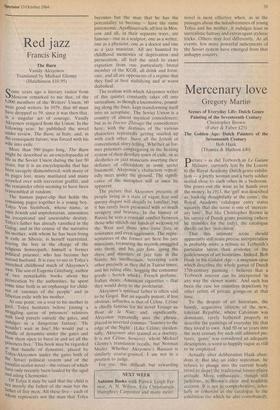Red jazz
Francis King
The Burn Vassily Aksyonov Translated by Michael Glenny (Hutchinson £10.95)
Some years ago a literary visitor from Moscow remarked to me that, of the 6,000 members of the Writers' Union, 60 were good writers. In 1979, that 60 must have dropped to 59, since it was then that, In a singular act of courage, Vassily Aksyonov resigned from the Union. In the following year, he published the novel under review, The Burn, in Italy, and, in the consequent furore, was forced with his Wife into exile.
More than 500 pages long, The Burn rnight be described as an encyclopaedia of life in the Soviet Union.during the last 50 Years; but it is an encyclopaedia that has been savagely dismembered, with many of Its pages lost, many mutilated and many scrawled over with irreverent graffiti, and the remainder often seeming to have been reassembled at random.
The human paper-clip that holds the remaining pages together is a young boy, Tolya Von Steinbock, whose name, at once Jewish and unproletarian, announces his exceptional and unenviable destiny. TolYa's father has already vanished in the Gulag; and in the course of the narrative his mother, with whom he has been living In exile in Siberia, is herself rearrested, leaving the boy in the charge of the religious homeopath, himself a former Political prisoner, who has become her second husband. It is easy to see in Tolya's wretched childhood much of Aksyonov's own. The son of Eugenia Ginzburg, author of two remarkable books about her Persecution by the authorities, he spent some time both in an orphanage for child- ren of 'enemies of the people' and in Siberian exile with his mother.
At one point, on a visit to his mother in gaol, Tolya hesitates before joining a straggling queue of prisoners' relatives With food parcels outside the gates, and indulges in a dangerous fantasy: 'He wouldn't wait in line! He would put a bundle of dynamite under the gates and blow them open to burst in and set all the Prisoners free.' This book may be regarded as that bundle of dynamite, placed by TolYa-Aksyonov under' the gates both of the Soviet political system and of the Socialist realist novel – the virtues of which have only recently been lauded by the aged and ailing Chernenko. Of Tolya it may be said that the child is nor merely the father of the man but the father of five men. All these five – each of Whom represents not the man that Tolya
becomes but the man that he has the potentiality to become – have the same patronymic. Apollinarivich; all live in Mos- cow and all, in their separate ways, are famous – one as a sculptor, one as a writer, one as a physicist, one as a doctor and one as a jazz musician. All are haunted by childhood memories of deprivation and persecution, all feel the need to exact expiation from one particularly brutal member of the KGB, all drink and forni- cate, and all are opponents of a regime that they find at best stultifying and at worst diabolical.
The realism with which Aksyonov writes of this quintet constantly takes off into surrealism, as though a locomotive, pound- ing along the lines, kept transforming itself into an aeroplane. The Soviet Union is a country of almost mystical coincidences; but as in Doctor Zhivago the coincidences here, with the destinies of the various characters repeatedly getting snarled up with each other, burst all the fetters of conventional story-telling. Whether as for- mer prisoners congregating in the heating system of their desolate town of exile, or as alcoholics or jazz musicians asserting their defiance of officialdom in some secret basement, Aksyonov's characters repeat- edly meet under the ground. The signifi- cance of the metaphor will at once be apparent.
The picture that Aksyonov presents of people living in a state of vague fear and queasy disgust will already be familiar; but it has rarely been presented with so much savagery and bravura. In the history of Russia he sees a constant conflict between those who stretch out hands of welcome to the West and those who raise fists in resistance and even aggression. The repre- sentatives of the former are here his jazz musicians, treasuring the records smuggled into them. and his jazz fans, aping the dress and manners of jazz fans in the States; his intellectuals, betraying each other precisely as they did in Tsarist times; and his ruling elite, hogging the consumer goods – Scotch whisky, French perfume, Italian shoes, American cigarettes – that they would deny to the proletariat.
Aksyonov's spiritual father is often said to be Gogol. But an equally potent, if less obvious, influence is that of Celine. Celine is chiefly famous for his novel Voyage au Bout de la Nuit; and, significantly, Aksyonov repeatedly uses the phrase, placed in inverted commas: 'Journey to the edge of the Night'. (Like Celine, inciden- tally, Aksyonov also trained as a doctor). It is not Celine, however, whom Michael Glenny's translation recalls, but Norman Mailer. Whether Aksyonov's Russian is similarly coarse-grained, I am not in a position to judge.
For me, this difficult but rewarding novel is most effective when, as in the passages about the misadventures of young Tolya and his mother, it indulges least in surrealistic fantasy and extravagant stylistic tricks. Others may feel differently. At all events, few more powerful indictments of the Soviet system have emerged from that unhappy country.






















































 Previous page
Previous page